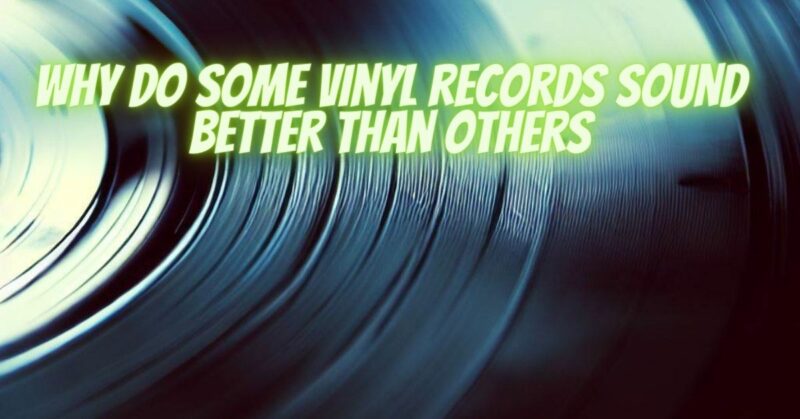Vinyl records have long captivated audiophiles and music enthusiasts with their warm, immersive sound. However, within the world of vinyl, not all records are created equal. Some vinyl records possess an exceptional sonic quality that sets them apart from the rest. In this article, we will explore the factors that contribute to why some vinyl records sound better than others, unraveling the mysteries behind this intriguing phenomenon.
Vinyl Quality and Pressing Techniques:
The quality of the vinyl itself plays a significant role in the sound reproduction. Higher-quality vinyl with lower levels of impurities tends to produce a cleaner, more accurate sound. Records pressed using virgin vinyl or premium audiophile-grade vinyl often exhibit superior sonic characteristics compared to records pressed using recycled or lower-grade materials.
Furthermore, the pressing techniques employed during manufacturing impact the sound quality. Factors such as the precision of the stamper, temperature control during pressing, and proper centering of the spindle hole can affect the record’s fidelity and minimize surface noise. Records pressed at reputable pressing plants with meticulous attention to detail often yield better sound quality.
Mastering and Vinyl Sound Optimization:
The mastering process, specifically tailored for vinyl, significantly influences the sonic outcome. Experienced mastering engineers understand the nuances and limitations of the vinyl format and make careful adjustments to optimize the sound quality. Balancing the frequency response, dynamic range, and overall tonal balance during mastering ensures optimal playback on vinyl.
Additionally, the choice of cutting engineer and mastering equipment can impact the final sound. Skilled cutting engineers with expertise in vinyl mastering and the use of high-quality mastering equipment contribute to the exceptional sound quality found in certain vinyl records.
Vinyl Production Techniques:
Various production techniques employed during the vinyl manufacturing process can affect the sound quality. Factors such as the quality and condition of the lacquer master used for cutting, the skill of the cutting engineer, and the accuracy of the plating process can all influence the final sound reproduction. Attention to detail and adherence to high-quality standards throughout the production process contribute to superior sound quality.
Record Storage and Care:
Proper storage and care of vinyl records are paramount to maintaining their sound quality over time. Exposure to extreme temperatures, high humidity, and direct sunlight can degrade the vinyl and affect the sound reproduction. Additionally, dust, dirt, and improper handling can introduce surface noise and reduce the overall fidelity of the record. Regular cleaning and proper storage in protective sleeves and jackets help preserve the sound quality and longevity of vinyl records.
Mastering and Label Variations:
In the realm of vinyl records, different mastering and label variations can result in varying sound quality. Different labels may employ distinct mastering techniques, cutting engineers, and pressing plants, resulting in differences in sound reproduction. Collectors often seek specific label variations known for their superior sound quality, adding to the allure and value of certain vinyl records.
The sonic disparities between vinyl records arise from a combination of factors, including the quality of the vinyl, pressing techniques, mastering and optimization for vinyl, production processes, and storage and care. Each element contributes to the overall sound reproduction and fidelity of the record. By understanding these factors and seeking out records that embody superior craftsmanship and attention to detail, collectors and enthusiasts can elevate their vinyl listening experience. So, embrace the quest for exceptional sound, appreciate the nuances of vinyl production, and let the music transport you to a realm of auditory bliss.


